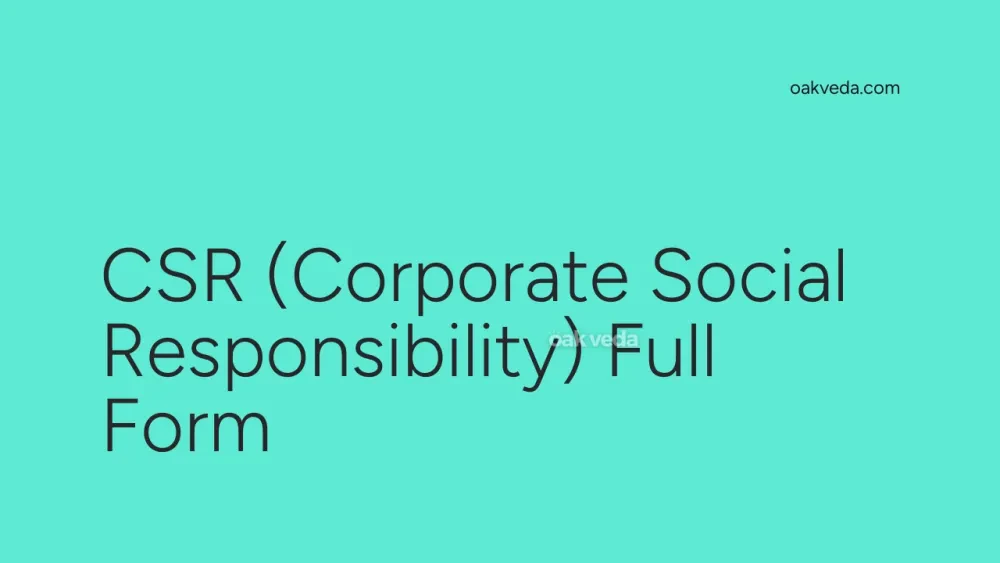
What is the Full Form of CSR?
The full form of CSR is Corporate Social Responsibility. This term has become increasingly important in the business world, reflecting a shift towards more ethical and sustainable business practices.
What is Corporate Social Responsibility?
Corporate Social Responsibility (CSR) is a business model that helps companies be socially accountable to themselves, their stakeholders, and the public. It involves consciously integrating social, environmental, and economic concerns into a company's values, culture, decision making, strategy, and operations.
Origin and Development of Corporate Social Responsibility
The concept of CSR has evolved significantly over the past few decades. While businesses have always had some degree of responsibility towards society, the formal concept of CSR emerged in the 1950s. It gained momentum in the 1970s and 1980s as environmental and social issues became more prominent.
In recent years, CSR has become a crucial aspect of corporate strategy, driven by increased public awareness, regulatory pressures, and the recognition that sustainable business practices can contribute to long-term success.
How does Corporate Social Responsibility work?
CSR works by integrating responsible practices into a company's core business operations. This includes:
- Setting clear CSR objectives aligned with the company's values
- Developing strategies to achieve these objectives
- Implementing CSR initiatives across various departments
- Measuring and reporting on the impact of these initiatives
- Continuously improving and adapting CSR efforts based on results and stakeholder feedback
Types of Corporate Social Responsibility
CSR can be categorized into several types:
- Environmental Responsibility: Efforts to reduce environmental impact and promote sustainability
- Ethical Responsibility: Ensuring fair and ethical business practices
- Philanthropic Responsibility: Charitable giving and community support
- Economic Responsibility: Maintaining profitability while considering societal impact
Functions of Corporate Social Responsibility
The primary functions of CSR include:
- Enhancing corporate reputation and brand image
- Improving employee engagement and retention
- Fostering positive relationships with stakeholders
- Contributing to sustainable development
- Mitigating risks associated with social and environmental issues
- Driving innovation through sustainable practices
Applications of Corporate Social Responsibility
CSR can be applied across various aspects of business operations:
- Supply chain management: Ensuring ethical sourcing and fair labor practices
- Product development: Creating sustainable and socially responsible products
- Human resources: Promoting diversity, inclusion, and employee well-being
- Marketing: Communicating CSR efforts transparently to stakeholders
- Finance: Integrating environmental, social, and governance (ESG) factors into investment decisions
Features of Corporate Social Responsibility
Key features of CSR include:
- Voluntariness: CSR initiatives often go beyond legal requirements
- Stakeholder Engagement: Involving various stakeholders in CSR decision-making
- Transparency: Open communication about CSR efforts and their impacts
- Long-term Perspective: Focusing on sustainable, long-term value creation
- Integration: Embedding CSR into core business strategies and operations
Benefits of Corporate Social Responsibility
Implementing CSR can lead to numerous benefits:
- Enhanced brand reputation and customer loyalty
- Improved employee morale and productivity
- Increased investor interest, particularly from socially responsible investors
- Cost savings through efficient resource use and waste reduction
- Innovation opportunities in developing sustainable products and services
- Better risk management and regulatory compliance
- Positive impact on local communities and society at large
Limitations or Challenges of Corporate Social Responsibility
Despite its benefits, CSR faces several challenges:
- Measuring Impact: Quantifying the results of CSR initiatives can be difficult
- Greenwashing: Some companies may use CSR as a marketing tool without genuine commitment
- Resource Allocation: Balancing CSR investments with other business priorities
- Stakeholder Expectations: Managing diverse and sometimes conflicting stakeholder demands
- Global Complexity: Implementing consistent CSR practices across different cultural and regulatory environments
Future Developments in Corporate Social Responsibility
The future of CSR is likely to see:
- Increased integration of CSR with core business strategies
- Greater focus on measurable impact and transparency
- Enhanced use of technology for CSR implementation and reporting
- More collaboration between businesses, governments, and NGOs
- Stronger emphasis on addressing global challenges like climate change and inequality
FAQs on CSR Full Form
-
Is CSR mandatory for all companies? In some countries, like India, CSR is mandatory for certain large companies. However, in many parts of the world, it remains largely voluntary.
-
How can small businesses implement CSR? Small businesses can start with simple initiatives like local community involvement, ethical sourcing, or energy-saving measures.
-
Does CSR impact a company's financial performance? While results vary, many studies suggest that effective CSR can positively impact long-term financial performance through improved reputation, customer loyalty, and operational efficiencies.
-
How is CSR different from philanthropy? CSR is a broader concept that integrates social responsibility into business operations, while philanthropy typically involves charitable donations or activities separate from core business functions.
-
Can CSR help in attracting talent? Yes, many job seekers, especially younger generations, prefer to work for companies with strong CSR programs and ethical practices.
In conclusion, Corporate Social Responsibility has become an integral part of modern business practices. As companies increasingly recognize their role in addressing social and environmental challenges, CSR continues to evolve, shaping the future of sustainable and responsible business.
You may be interested in:

